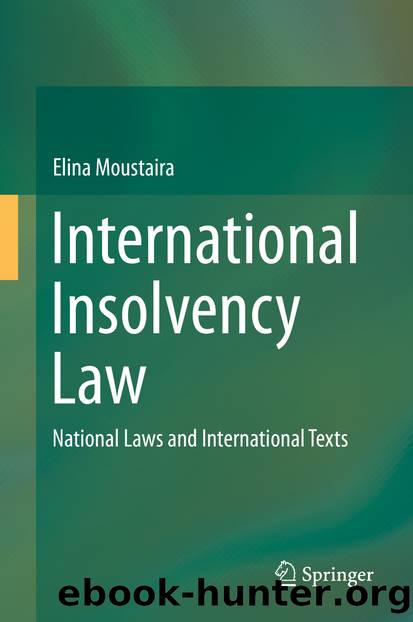International Insolvency Law by Elina Moustaira

Author:Elina Moustaira
Language: eng
Format: epub
ISBN: 9783030044503
Publisher: Springer International Publishing
5.2.1.1.1 Avoidance Actions: Re Condor Insurance Ltd
On November 16, 2007, Condor Insurance declared bankruptcy in St. Kitts & Nevis and its liquidators filed for Chapter 15 recognition in the U.S. Bankruptcy Court for the District of Mississippi.
On May 18, 2007, the bankruptcy court recognized Condor Insurance as a foreign main proceeding. The foreign liquidator filed an avoidance action under St. Kitts & Nevis law against Condor Guarantee Trust, Condor Insuranceâs U.S. subsidiary, seeking to invalidate an allegedly fraudulent large transfer of US $313 million that the foreign company has done to its U.S. affiliate.37
On July 17, 2008, the U.S. Bankruptcy Court dismissed the avoidance action, stating that Condor Insurance should first file a plenary proceeding under Chapter 7 or Chapter 11 to file for an avoidance action.38
According to Section 1523, a foreign representative has the standing to invoke the U.S. avoidance provisions where full bankruptcy proceedings have been commenced in USA under Chapter 7 or Chapter 11 of the U.S. Bankruptcy Code.
However, U.S. and non-U.S. insurance companies may not be debtors under federal bankruptcy law, are precluded from using Chapters 7 and 11, according to Section 109(3) of the U.S. Bankruptcy Code.
Therefore, Condor Insurance (its foreign representative) appealed the U.S. Bankruptcy Courtâs decision. On February 9, 2009, the U.S. District Court affirmed the Bankruptcy Courtâs decision.39
The foreign representative of Condor Insurance then appealed to the Fifth Circuit. On March 17, 2010, the U.S. Court of Appeals for the Fifth Circuit reversed the two lower court decisions and held that pursuant to Section 1521, U.S. courts may grand avoidance relief via Chapter 15, but only pursuant to a non-U.S. avoidance law applicable in the main insolvency case.40
The U.S. Court of Appeals stated that while Section 1521 precludes avoidance under U.S. law, it is silent on avoidance actions under non-U.S. law and interpreted that silence as allowing them. The court said that â[t[hough the language does not explicitly address the use of foreign avoidance law, it suggests a broad reading of the powers granted to the district court in order to advance the goals of comity to foreign jurisdictions.â41
The Court of Appeals referred to the previously valid Section 30442 and stated that Section 1521 adopts the above rule from In re Metzeler,43 an older case decided by a U.S. district court. In that case, it had been asserted that a non-US insolvency representative may only commence an avoidance action under the non-US law governing the main insolvency case in an ancillary proceeding under Section 304, because the US Bankruptcy Code did not explicitly permit non-US insolvency representatives to invoke US avoiding powers.
The rationale behind this decision was on the one hand to avoid the need for Chapter 7 or Chapter 11 plenary proceedings brought under U.S. law and on the other hand to prevent the country from becoming a haven for fraudulent transfers by insurance companies. As the Court of Appeals stated:Congress did not intend to restrict the powers of the U.S. court to apply the law of the country where the main proceeding pends.
Download
This site does not store any files on its server. We only index and link to content provided by other sites. Please contact the content providers to delete copyright contents if any and email us, we'll remove relevant links or contents immediately.
The Rule of Law by Bingham Tom(1316)
The Holocaust: A New History by Laurence Rees(1232)
Political Theology by Carl Schmitt(1184)
Pirates of Somalia by Jay Bahadur(1112)
Restitution by Restitution(1111)
The Social Animal by David Brooks(1111)
A Practical Guide to International Arbitration in London by Hilary Heilbron(1077)
Coercing Virtue by Robert H. Bork(1022)
The Nuremberg Interviews by Leon Goldensohn(985)
Basic International Corporate Taxation by Sebastiano Garufi(925)
A History Of Thailand by Baker Chris(887)
Asian Waters by Humphrey Hawksley(875)
International Trade and Business: Law, Policy and Ethics by Gabriël Moens & Peter Gillies(867)
Blood Profits by Vanessa Neumann(866)
Spring Fever: The Illusion of Islamic Democracy by McCarthy Andrew C(865)
The Global Commons by Susan J. Buck(861)
Crimes Against Humanity: Historical Evolution and Contemporary Application by M. Cherif Bassiouni(793)
The Sovereignty of Human Rights by Macklem Patrick(789)
The Nuremberg Trials: The Nazis and their Crimes Against Humanity by Roland Paul(788)
